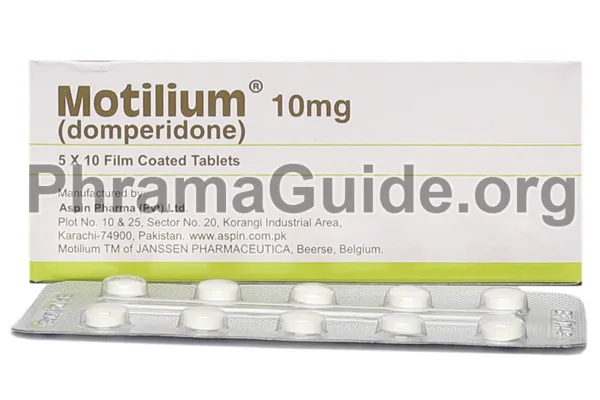Motilium is a medication that is used to treat gastrointestinal disorders such as nausea, vomiting, and gastric motility problems. Like all medications, it can have side effects.
Common Side Effects of Motilium
- Headache: Some people may experience headaches while taking Motilium.
- Dry mouth: A sensation of dryness in the mouth can occur as a side effect.
- Abdominal cramps: Motilium may cause abdominal discomfort or cramps in some individuals.
- Diarrhea: It can occasionally lead to diarrhea as a side effect.
- Dizziness: Some people may feel dizzy while taking this medication.
- Nervousness: Motilium may cause nervousness or anxiety in some individuals.
- Breast enlargement and tenderness: This is more common in men and may occur because Motilium can increase the level of prolactin, a hormone that stimulates breast development and milk production.
- Irregular menstrual periods: Some women may experience changes in their menstrual cycle while taking Motilium.
- Rash or itching: Skin reactions such as rash or itching can occur as a side effect.
- Swelling of the feet or ankles: In rare cases, fluid retention and swelling in the extremities may occur.
- Heart rhythm abnormalities: Although rare, Motilium can affect the electrical activity of the heart, leading to potentially serious heart rhythm problems. This risk is higher in people with certain underlying conditions or when taken at high doses.
- Allergic reactions: In very rare cases, individuals may experience severe allergic reactions to Motilium, which can include symptoms like hives, difficulty breathing, and swelling of the face, lips, tongue, or throat.

What is Motilium?
Motilium is one of the leading brands of Domperidone, manufactured and marketed by Janssen Pharmaceutica
Mtilium : Available Formulations and Strengths
Presently, Motilium is available in Tablet and Syrup forms.
Motilium Tablet : 10mg strength.
Motilium Syrup : 1mg/ml strength.
What Are The Possible Drug Interactions of Mtilium?
- Antifungal Agents (e.g., ketoconazole, fluconazole): These drugs can inhibit the metabolism of Motilium, potentially increasing its levels in the blood and the risk of side effects.
- Antibiotics (e.g., erythromycin): Erythromycin can also inhibit the metabolism of Motilium, leading to higher levels of the drug in the blood.
- Certain Antidepressants (e.g., fluoxetine, paroxetine): Some antidepressants, particularly those classified as selective serotonin reuptake inhibitors (SSRIs), can increase the risk of abnormal heart rhythms when taken with Motilium.
- Antipsychotic Medications (e.g., haloperidol, risperidone): Combining Motilium with certain antipsychotic drugs can also increase the risk of abnormal heart rhythms.
- Medications that prolong the QT interval: Motilium itself can prolong the QT interval (a measure of electrical activity in the heart). When taken with other medications that also prolong the QT interval, there is an increased risk of serious heart rhythm disturbances. These medications include certain antiarrhythmics, antipsychotics, and antibiotics.
- Certain HIV medications: Some medications used to treat HIV, like ritonavir and saquinavir, can inhibit the metabolism of Motilium, potentially leading to increased Motilium levels in the blood.
- Grapefruit Juice: Grapefruit juice can inhibit the metabolism of Motilium, increasing its levels in the blood. It’s advisable to avoid grapefruit or grapefruit juice while taking Motilium.
- Alcohol: Combining alcohol with Motilium can increase the risk of dizziness and central nervous system depression.

Leave A Comment